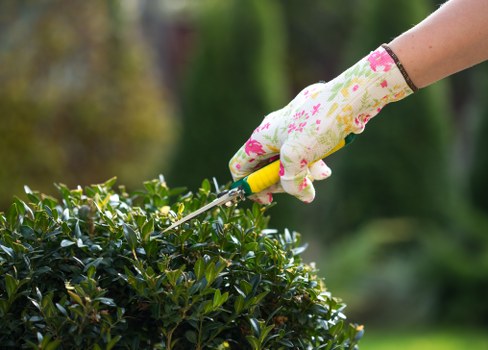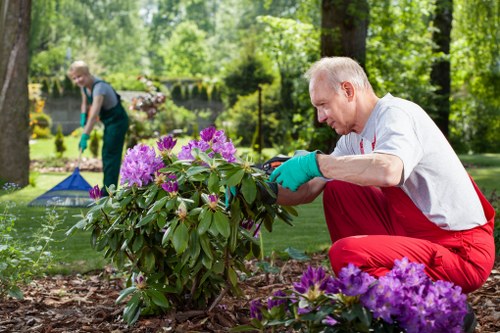Comprehensive Guide to Garden Fence Installation in Leamouth

Installing a garden fence in Leamouth can significantly enhance the beauty, security, and functionality of your outdoor space. Whether you're looking to create a private sanctuary, protect your plants, or simply add an aesthetic touch to your garden, choosing the right fence and installation method is crucial.
Leamouth, known for its vibrant community and picturesque landscapes, offers a variety of options for garden fence installation. From traditional wooden fences to modern metal designs, there's something to suit every taste and budget.
In this guide, we'll walk you through everything you need to know about installing a garden fence in Leamouth, including types of fences, materials, installation steps, and maintenance tips to ensure your fence stands the test of time.

Benefits of Installing a Garden Fence
Installing a garden fence offers numerous advantages that go beyond mere aesthetics. Here are some key benefits:
- Privacy: A fence provides a sense of seclusion, allowing you to enjoy your garden without prying eyes.
- Security: It acts as a deterrent to intruders, protecting both your property and loved ones.
- Boundary Definition: Clearly marks the limits of your garden, preventing accidental encroachments.
- Wind Protection: Shields your plants from strong winds, promoting healthier growth.
- Enhancing Curb Appeal: A well-designed fence can significantly boost the overall look of your property.

Choosing the Right Fence for Your Garden
When selecting a fence for your garden in Leamouth, consider the following factors:
1. Material
The material of your fence will determine its durability, maintenance requirements, and overall appearance. Common materials include:
- Wood: Offers a classic look and can be painted or stained to match your garden's aesthetic.
- Metal: Includes options like wrought iron and aluminum, known for their strength and longevity.
- Vinyl: A low-maintenance alternative that mimics the appearance of wood.
- Composite: Made from a blend of wood fibers and plastics, providing durability with minimal upkeep.
2. Height and Style
The height and style of your fence should complement your garden's design while meeting your specific needs. Consider whether you need a tall fence for privacy or a shorter one for decorative purposes.
3. Budget
Your budget will play a significant role in determining the type of fence you can afford. Wooden fences tend to be more budget-friendly, while metal and composite options may require a higher investment.

Steps to Install a Garden Fence
Installing a garden fence involves several key steps to ensure a successful and durable result. Here's a step-by-step guide:
1. Planning and Measurement
Begin by measuring the perimeter of your garden to determine the total length of the fence required. Decide on the fence height, style, and the number of panels needed.
2. Gathering Materials and Tools
Ensure you have all the necessary materials and tools before starting the installation. Common materials include fence panels, posts, concrete, screws or nails, and any decorative elements.
3. Marking the Fence Line
Use stakes and string to outline the fence line accurately. This will serve as a guide during the installation process.
4. Installing Fence Posts
Dig holes for the fence posts at regular intervals, typically every 6 to 8 feet. Insert the posts and secure them with concrete to ensure stability.
5. Attaching Fence Panels
Once the posts are set, attach the fence panels securely using screws or nails. Ensure that each panel is level and properly aligned.
6. Finishing Touches
After the panels are in place, add any finishing touches such as painting, staining, or adding decorative accents to enhance the fence's appearance.

Maintenance Tips for Longevity
Proper maintenance is essential to keep your garden fence looking great and functioning effectively for years to come. Here are some maintenance tips:
- Regular Inspections: Check your fence regularly for any signs of damage or wear, such as loose boards or rust spots.
- Cleaning: Clean the fence periodically to remove dirt, moss, and debris. Use appropriate cleaning agents based on the material of your fence.
- Repairs: Promptly address any issues like broken panels or unstable posts to prevent further damage.
- Painting or Staining: Reapply paint or stain as needed to protect the fence from the elements and maintain its appearance.
- Weather Protection: In Leamouth's varied climate, consider additional protective measures like sealants to guard against moisture and UV damage.
Local Expertise: Garden Fence Installation in Nearby Areas
Leamouth is surrounded by several vibrant neighborhoods, each offering unique features that cater to garden fence installation needs. Here are some of the closest areas:
- East India Dock: Known for its waterfront views, East India Dock provides opportunities for decorative metal fences that complement the scenic backdrop.
- Wapping With its historic charm, Wapping residents often opt for traditional wooden fences that blend seamlessly with the area's architecture.
- Poplar A diverse community like Poplar benefits from versatile fence designs, including vinyl and composite options that require minimal maintenance.
- Canning Town In this bustling area, security-focused fences made from sturdy materials like wrought iron are popular choices.
- Stratford Home to many gardens and parks, Stratford offers a range of fence styles to enhance both private gardens and public spaces.
- Blackwall With its mix of residential and commercial properties, Blackwall requires adaptable fence solutions that cater to various property types.
- Custom House Custom House residents often seek modern and sleek fence designs that reflect the area's contemporary vibe.
- Canary Wharf: Amidst the high-rise buildings, garden fences in Canary Wharf focus on durability and low maintenance to suit the urban environment.
- Greenwich Greenwich's rich history inspires fence designs that incorporate classic elements with modern functionality.
- Silvertown Silvertown's industrial background favors robust and functional fencing options that offer both security and style.
- Millwall Proximity to the river makes Millwall ideal for fences that can withstand moisture and other environmental factors.
- Canning Town North: This area benefits from a mix of fence materials, allowing homeowners to choose based on personal preference and property needs.
- Beckton Beckton offers a variety of fence styles, including ornamental and functional designs that enhance the area's residential appeal.
- Woolwich With a blend of historic and modern properties, Woolwich fences range from traditional wooden panels to contemporary metal works.
- North Woolwich North Woolwich's dynamic community favors innovative fence solutions that provide both privacy and aesthetic value.
Choosing the Right Professional for Installation
While DIY installation is an option, hiring a professional can ensure that your garden fence is installed correctly and efficiently. Here are some tips for selecting the right installer:
- Experience: Look for installers with a proven track record in garden fence installation, particularly in the Leamouth area.
- Reputation: Check reviews and ask for references to gauge the quality of their work and customer satisfaction.
- Licensing and Insurance: Ensure that the professional is licensed and insured to protect yourself from any potential liabilities.
- Portfolio: Review their previous projects to see if their style aligns with your vision for your garden.
- Quotes and Estimates: Obtain multiple quotes to compare pricing and ensure you're getting a fair deal.
Cost Factors to Consider
The cost of garden fence installation in Leamouth can vary based on several factors:
- Material: Different materials come at different price points, with wood generally being more affordable than metal or composite options.
- Fence Height and Length: Taller and longer fences require more materials and labor, increasing the overall cost.
- Design Complexity: Intricate designs or custom features may require additional time and expertise, driving up costs.
- Installation Difficulty: Uneven terrain or challenging landscapes can complicate installation, leading to higher expenses.
- Permits and Regulations: In some cases, you may need permits for fence installation, which can add to the cost.
Permits and Regulations in Leamouth
Before installing a garden fence in Leamouth, it's essential to be aware of local regulations and permit requirements. These may include:
- Height Restrictions: There may be limits on how tall your fence can be, especially if it's adjacent to public pathways or streets.
- Boundary Lines: Ensure your fence is placed within your property boundaries to avoid disputes with neighbors.
- Material Guidelines: Some areas may have rules regarding the types of materials allowed for fences.
- Aesthetic Requirements: In historic or aesthetically focused neighborhoods, there may be guidelines to maintain a certain look.
Consult with the local council or a professional installer to ensure compliance with all relevant regulations.
Eco-Friendly Fence Options
For environmentally conscious homeowners in Leamouth, there are several eco-friendly fence options available:
- Sustainable Wood: Choose wood from sustainably managed forests to minimize environmental impact.
- Recycled Materials: Fences made from recycled metals or plastics reduce waste and promote sustainability.
- Natural Stone: Stone fences offer a durable and natural look while being environmentally friendly.
- Bamboo: A rapidly renewable resource, bamboo fences are both sturdy and aesthetically pleasing.
Integrating Your Fence with Garden Design
A well-integrated fence can complement your garden's overall design. Consider the following tips:
- Color Coordination: Match the fence color with your garden's color palette for a harmonious look.
- Ornamental Features: Incorporate decorative elements like lattice work, trellises, or climbing plants to enhance visual appeal.
- Functional Additions: Add features such as gates, planters, or lighting to increase functionality and beauty.
- Consistent Style: Ensure the fence style aligns with your home's architecture and garden theme.
Common Mistakes to Avoid
To ensure a successful garden fence installation in Leamouth, avoid these common mistakes:
- Poor Planning: Failing to measure accurately or consider local regulations can lead to installation issues.
- Ignoring Maintenance: Neglecting regular upkeep can shorten the lifespan of your fence.
- Choosing the Wrong Material: Selecting a material that doesn't suit your climate or aesthetic can result in dissatisfaction.
- Improper Installation: DIY installations without proper knowledge can lead to unstable and unsafe fences.
- Overlooking Environmental Impact: Not considering eco-friendly options may contribute to unnecessary environmental harm.
Enhancing Privacy with Your Fence
If privacy is a primary concern, here are some ways to enhance it with your garden fence:
- Tall Fences: Opt for taller fence designs to block views from neighboring properties.
- Solid Panels: Choose solid panels instead of slatted or picket fences to prevent visibility.
- Strategic Planting: Combine fencing with tall plants or shrubs to create a natural privacy screen.
- Strategic Placement: Position the fence in locations that maximize privacy without obstructing natural light.
Seasonal Considerations for Fence Maintenance
Different seasons require specific maintenance practices to keep your fence in top condition:
Spring
Inspect your fence for any winter damage such as cracks or missing boards. Clean and prepare the fence for the growing season by removing debris and applying protective treatments.
Summer
Maintain your fence by ensuring it remains free from overgrowth and excessive moisture. Apply stain or paint if necessary to protect against UV damage.
Autumn
Clear leaves and organic matter to prevent moisture accumulation and potential rot. Prepare for colder weather by reinforcing any weak sections.
Winter
Protect your fence from harsh weather by applying sealants and storing any removable parts indoors if possible. Regularly check for ice damage and make necessary repairs.
Conclusion
Installing a garden fence in Leamouth is a valuable investment that can transform your outdoor space in numerous ways. By carefully selecting the right materials, adhering to local regulations, and ensuring proper installation and maintenance, you can enjoy a beautiful, functional, and long-lasting fence for years to come.
Frequently Asked Questions
1. How long does it take to install a garden fence in Leamouth?
The installation time can vary depending on the fence type, size of the garden, and complexity of the design. On average, a standard garden fence installation may take anywhere from a few days to a week.
2. Do I need a permit to install a garden fence in Leamouth?
Permit requirements depend on the fence's height, location, and materials used. It's best to consult with the local council or a professional installer to determine if a permit is necessary for your specific project.
3. What is the most durable material for a garden fence in Leamouth's climate?
Metal and composite materials are typically the most durable options for Leamouth's climate, as they resist moisture, pests, and extreme weather conditions better than traditional wood.
4. Can I install a garden fence myself, or should I hire a professional?
While DIY installation is possible, hiring a professional ensures that the fence is installed correctly and complies with local regulations. Professionals also typically guarantee their work, providing peace of mind.
5. How can I make my garden fence more eco-friendly?
Choose sustainable materials like recycled metals, composite wood, or bamboo. Additionally, use eco-friendly stains and paints, and incorporate natural elements like climbing plants to enhance the fence's environmental friendliness.